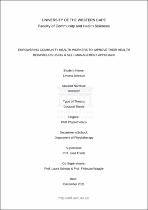Empowering community health workers to improve their health behaviours using a self-management approach
Abstract
South Africa and the Western Cape Province are under severe strain with an increasing quadruple burden of disease, and a deficit in the number of professionally trained healthcare workers available to meet the health needs of the population. Risky health behaviours have contributed to the rising prevalence of non-communicable disease, which in turn has largely contributed to the burden of disease. Community health workers are key frontline workers, who have been specifically appointed as links between the professional health force and the communities, to act as change agents and advocate for improved health behaviours. Taking into consideration that more than 80% of the population is dependent on the public health system, and in particular, the primary healthcare sector, these laypersons have a mammoth task to fulfil.

